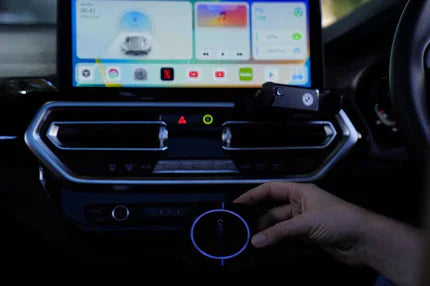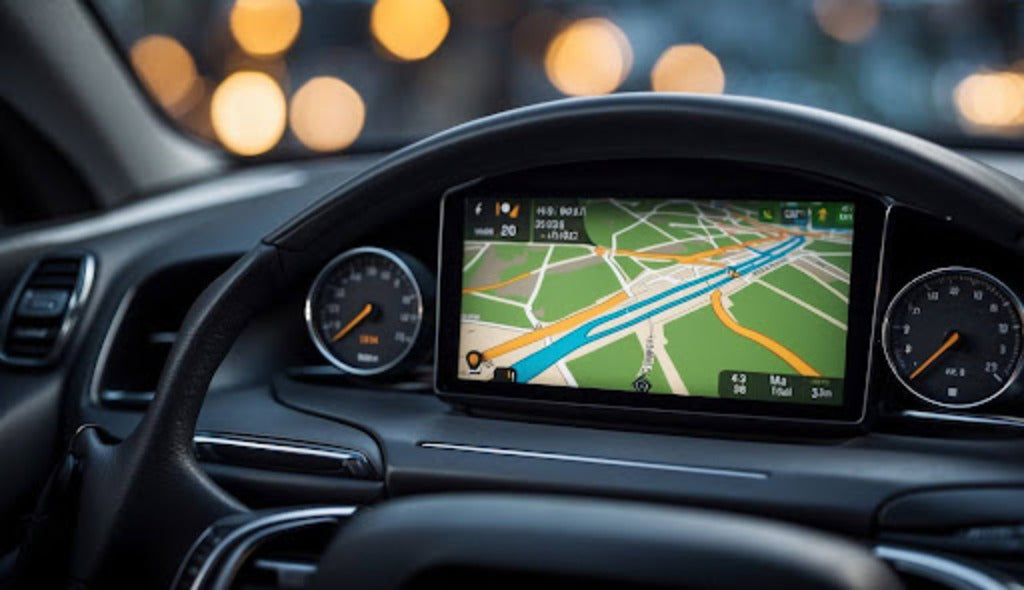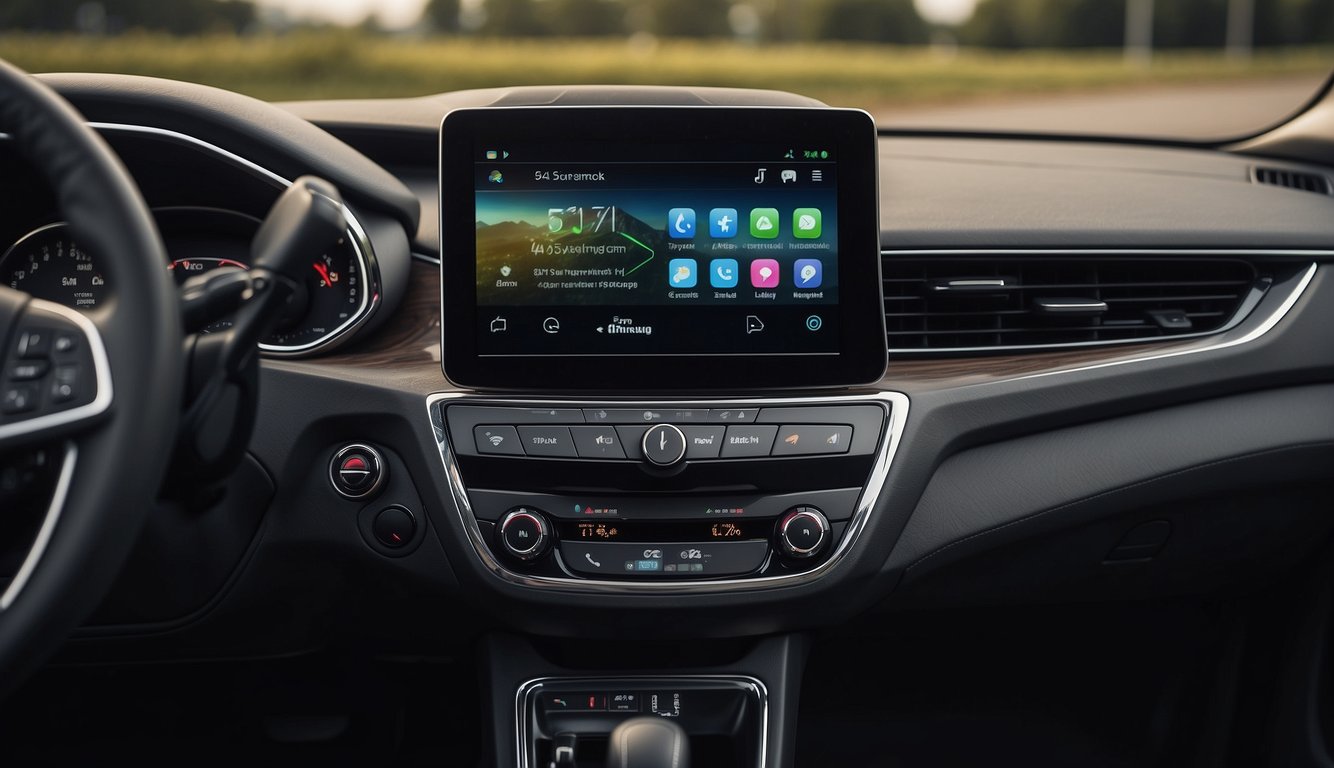Are you tired of constantly plugging in your phone to use CarPlay? The good news is, you can easily convert your wired CarPlay to wireless without much fuss.
There are several wireless CarPlay adapters available that make this transition smooth and efficient.

One popular option is the CARLUEX LINK Wireless CarPlay Adapter. This device connects seamlessly to your car's USB port and pairs with your iPhone, providing a hassle-free experience every time you get in your car.
Another notable adapter is CARLUEX GO, known for its stable and fast connection.
These adapters are compatible with a wide range of vehicles and iPhone models, making it easy for anyone to make the switch. Now, you can enjoy a truly wireless CarPlay experience without the need to upgrade your entire system.
Understanding CarPlay and Its Evolution

Apple's CarPlay has transformed the way people interact with their car’s infotainment system. This section will cover what CarPlay is, compare wired and wireless options, and highlight the benefits of wireless CarPlay.
The Basics of CarPlay
CarPlay is an app from Apple that integrates your iPhone with your car’s infotainment system. It allows you to send messages, use navigation apps like Apple Maps and Google Maps, listen to music, and control your phone through voice commands using Siri.
This app minimizes distractions by providing a simplified, car-friendly interface. It supports third-party apps like Spotify and Audible, which further enhance your driving experience.
Wired vs. Wireless CarPlay
Wired CarPlay requires you to connect your iPhone to your car using a USB cable. This setup usually offers more stable and faster data transfer, resulting in minimal latency. However, it restricts your movement since your phone must remain connected physically.
Wireless CarPlay, on the other hand, connects your iPhone through Bluetooth or Wi-Fi. This option frees you from cables, but you may sometimes experience connectivity issues or slight lag.
Some adapters can convert your existing wired setup into a wireless one for more convenience.
Benefits of Wireless CarPlay
Wireless CarPlay offers greater freedom and ease of use since you don't need to plug in your phone every time you get in the car. It supports over-the-air software updates, which can enhance features without needing a new cable or hardware.
This option also lets you keep your phone in your pocket or bag, reducing clutter in the car. Additionally, wireless CarPlay provides a more seamless and integrated experience with your car’s infotainment system, making navigation and other functions smoother.
How to Turn Wired CarPlay into Wireless?

Switching from a wired to a wireless CarPlay setup enhances convenience and ease of use. Here’s what you need to know about selecting an adapter, installing it, and ensuring it's compatible with your vehicle.
Available Wireless CarPlay Adapters
Several wireless CarPlay adapters on the market can convert your existing wired setup.
Popular choices include the CARLUEX LINK, CARLUEX AIR, and CARLUEX PRO+ adapters.
For example, the CARLUEX LINK Wireless CarPlay Adapter connects to your car's USB port and links your iPhone via Bluetooth and WiFi. Each adapter offers unique features and compatibility, so it's essential to check specifications before purchasing.
Installation and Setup
To install a wireless CarPlay adapter, plug the device into your car’s USB port, usually used for wired CarPlay.
Next, pair your iPhone to the adapter using Bluetooth.
For instance, the CARLUEX AIR Wireless Apple CarPlay adapter simplifies this process with easy-to-follow instructions.
Most adapters will also prompt connection to WiFi for a stable and seamless experience.
Compatibility and Considerations
When choosing a CarPlay adapter, ensure it is compatible with your car’s infotainment unit.
Some adapters may not work with all aftermarket head units or specific vehicle models.
Check for any known issues with your car model. Adapters like CARLUEX provide a list of supported vehicles to assist in the selection process.
Enhancing the Driving Experience

Enhancing your driving experience involves integrating technology seamlessly with your car's existing functions, optimizing audio and voice controls, and managing calls and messages efficiently. These improvements help create a safer and more enjoyable journey.
Integrating With Vehicle Functions
Wireless CarPlay adapters allow you to use CarPlay without needing cables, making it easier to use your phone's functions.
This means access to Siri, navigation, and music right from your car's display.
Using an adapter, you can control these features with your steering wheel controls. This ensures that you can keep your hands on the wheel and focus more on the road while still accessing important functions like voice control.
Optimizing Audio and Voice Controls
Good audio quality is crucial while driving.
Wireless CarPlay adapters help improve sound quality by reducing interference from cables. This is great for enjoying music, podcasts, and hands-free phone calls during your drives.
Voice control through Siri or Google Assistant also becomes more responsive.
This helps in quickly finding songs, setting navigation routes, or sending messages without taking your eyes off the road. It's a better, more immersive experience while keeping everything hands-free.
Managing Calls and Messages
One of the biggest benefits of a wireless CarPlay adapter is managing calls and messages effortlessly.
You can answer phone calls using your voice or steering wheel controls, making it safer and more convenient.
For messages, using Siri or other voice assistants allows you to send and receive SMS without needing to look at your phone. This way, you stay connected while driving, minimizing distractions and enhancing safety.
Considerations Before Purchase

When converting your wired CarPlay to wireless, you need to evaluate various factors to make the best choice. You'll look at different brands, consider costs versus benefits, and understand warranty and support options.
Cost Versus Benefits
Price is an important factor.
CARLUEX LINK Wireless CarPlay Adapter and CARLUEX AIR CarPlay Wireless Adapter are generally more affordable, while brands like CARLUEX PRO+ and CARLUEX BMW tend to be pricier but offer premium features.
You must weigh the cost against the benefits each adapter provides.
For instance, pricier models might offer better connectivity and faster response times, which can enhance your driving experience. Cheaper models may lack some advanced features, but they still perform the basic function of converting your wired CarPlay to wireless.
Understanding Product Warranty and Support
Warranty and customer support are crucial when purchasing a wireless CarPlay adapter.
Brands like CARLUEX often provide comprehensive warranties, which can give you peace of mind.
Check the duration of the warranty and what it covers. Some warranties cover only certain parts, while others might include full replacement.
Also, consider the customer support quality.
Reliable brands offer easy-to-reach support through multiple channels like phone, email, and live chat. This can be especially helpful if you encounter issues with your adapter.
Frequently Asked Questions

Discover the best ways to convert your wired CarPlay setup to wireless, which adapters to use, and the criteria for selecting the best one. Learn about compatibility with various car models and the practicality of retrofitting wireless CarPlay into your existing car.
What adapters are available to convert wired CarPlay to wireless?
There are several adapters on the market that can convert wired CarPlay to wireless.
Popular options include the CARLUEX AIR Wireless CarPlay Adapter, CARLUEX LINK Wireless CarPlay Adapter, and the CARLUEX PRO+ Wireless Car Adapter.
You connect these adapters via your car's USB port and pair them with your iPhone using Bluetooth and WiFi.
How to enable wireless CarPlay in a car that originally has wired CarPlay?
To enable wireless CarPlay, plug the wireless CarPlay adapter into your car’s USB port that you usually use for wired CarPlay. Then, pair your iPhone with the adapter. This process is simple and does not require technical skills.
Which are the top-rated wireless CarPlay adapters in 2024?
Some of the top-rated wireless CarPlay adapters in 2024 include the CARLUEX AIR Wireless CarPlay Adapter, CARLUEX LINK Wireless CarPlay Adapter, and the CARLUEX PRO+ Wireless Car Adapter.
The CARLUEX PRO+ Wireless Car Adapter is known for its reliability and compatibility with many car models.
Is it possible to retrofit an existing car with wireless CarPlay functionality?
Yes, it is possible to retrofit an existing car with wireless CarPlay functionality using a compatible wireless adapter.
These adapters are specifically designed to connect to the USB port used for wired CarPlay and do not require additional hardware modifications.
Can a wireless CarPlay connection be established on any car model?
Wireless CarPlay adapters generally work on most car models that support wired CarPlay.
However, it's essential to check the adapter’s compatibility with your specific car model before purchasing, as some adapters may have restrictions based on the car's make and year.
What factors should be considered when choosing a wireless CarPlay adapter?
When choosing a wireless CarPlay adapter, consider factors such as compatibility with your car model, ease of installation, connection stability, and price.
Adapters like the CARLUEX LINK offer a good balance of these features, making them reliable choices for users looking to upgrade from wired to wireless CarPlay.








Leave a comment
This site is protected by hCaptcha and the hCaptcha Privacy Policy and Terms of Service apply.